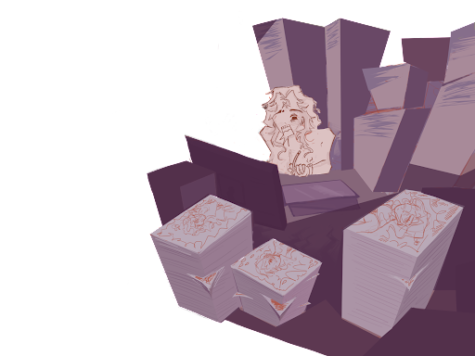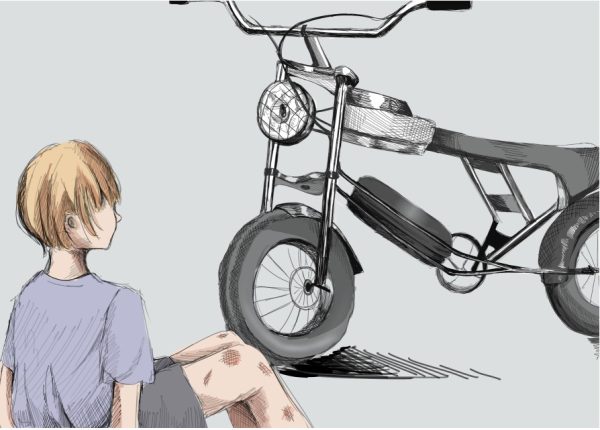Staff Editorial: Redefining Hustle Culture
For many students, it is easy to fall victim to hustle culture and the illusion of hyper-productivity, but a healthy lifestyle involves more than just ‘hustling’
A student’s table is covered in enormous piles of paper from different classes and volunteer forms. Her schedule, where every hour of her day is broken into things that have to be done, hangs above that table slightly touched by the rays of sunrise which she has not fully noticed in awhile. She has not slept and her hair is tied in a messy bun. Her muscles are still sore from yesterday’s intense workout, a must do routine in her no less intense schedule. Her head finally falls on the table, and she wakes up. This is the lifestyle of another hustle culture victim.
As the description suggests, hustle culture is the idea that working for long hours, generally sacrificing self-care for increased productivity, is necessary to be successful. According to the American business magazine Forbes, “Hustle culture puts work at the center of life. Long working hours are praised and glorified.Time off is seen as laziness.” Some argue hustle culture is beneficial as it improves one’s discipline, confidence, and mental toughness, in addition to increasing productivity and thus leading to greater career success. However, this way of life does not come without drawbacks. Constantly working or “grinding” can lead to burnout. Moreover, hustle culture narrowly defines success, focusing mainly on one’s career. But a career may not necessarily be what everyone defines as success. Others may prefer to build a family or perfect a hobby, both of which are often sacrificed in hustle culture. Hustle culture has now overtaken social media, furthering the idea that one must always maximize their productivity. Online identities such as “that girl” represent the constant pursuit of productivity and material success.
Due to hustle culture’s proliferation on the internet, many may be lost on how exactly to navigate through hustle culture. For starters, we can learn to counter hustle culture by encouraging hobbies outside of one’s career. In order to do this, we need to introduce a culture centering around the opposite: viewing breaks as a form of self-care and productivity. “Contrary to hustle culture, break culture prioritizes mental well-being and encourages people to work fewer hours, but with a clearer and more focused mind,” said Forbes. Having the ability to fully process what you are doing, thanks to these breaks, can allow you to set goals more sustainably. It is similar to a car attempting to run on no gas, it is simply impossible to do. The breaks can act as fuel for us, supporting our mental health and ensuring that we do not burn out quicker. The type of break that you take depends on the person, but many find relaxation in stretching or simply going offline for a while. Finding the right balance takes time and effort, but when found, it can lead to breakthroughs in our collective wellbeing.
The main issue regarding hustle culture stems from the fact that, at face value, many of the practices promoted by it are healthy and beneficial, such as going to the gym or spending some time earning money outside of one’s regular job. Problems arise, however, when people attempt to spend all of their waking hours attempting to be productive, without doing anything for the sake of relaxation and personal enjoyment. “All this trend [hustle culture] is promoting what is known as hyper-productivity, or toxic hustle–culture, the feeling that a person has to work tirelessly or engage in radical self-improvement routines to be productive,” Martin Preston, founder and chief executive at Private Rehab Clinic Delamere, said. There is a fine line between hustle culture, which is unsustainable, and working hard at one’s profession and attempting to maximize productivity. In order to ensure that one is not falling victim to hustle culture, a quality solution is to engage in a hobby; any activity engaged in that falls outside of one’s normal occupation with the purpose of relaxation in mind. This also means that there is absolutely no requirement that you need, or even should, be particularly good at your hobbies. “If we’re bad at something, it’s harder to do, which means it requires more focus. If we don’t give up and enjoy the challenge, we become immersed in what we’re doing,” Heather Grant from Medium blog said. Clearly, being bad at your hobbies may provide even more benefits, as it allows for full immersion in the activity, removing any stress or focus from day-to-day life. In the end, it is not inherently bad to apply yourself at work or at the gym, but it is important to remember that not every minute of every day must be spent building towards something. It is acceptable to have fun and relax as well.
By being aware of our own participation in hustle culture, we can slowly move away from hustle culture and as a result, move towards finding the perfect work-life balance suited to our own needs.

Your donation will support the student journalists of Woodbridge High School. Your contribution will allow us to purchase equipment and cover our annual website hosting costs.






